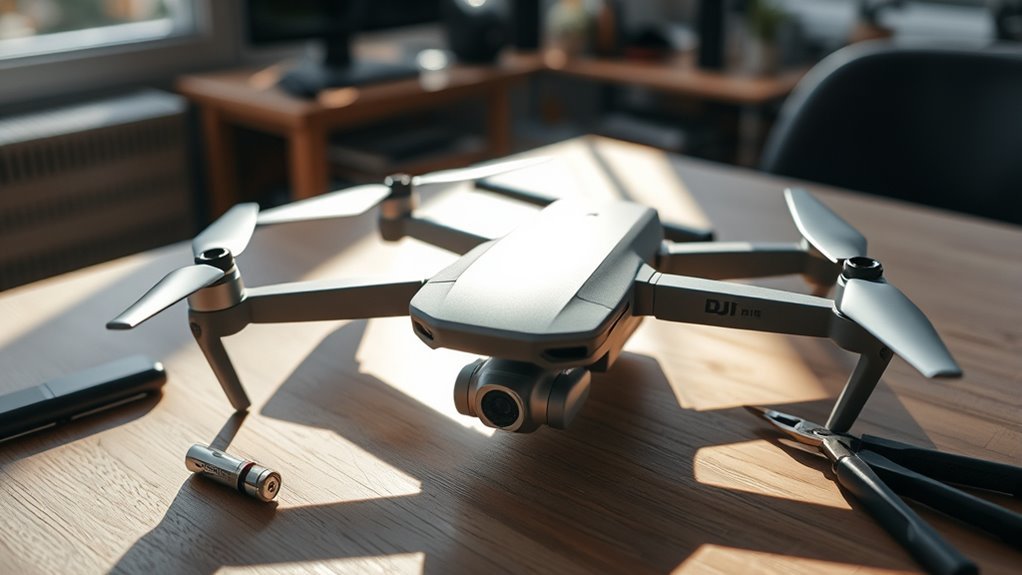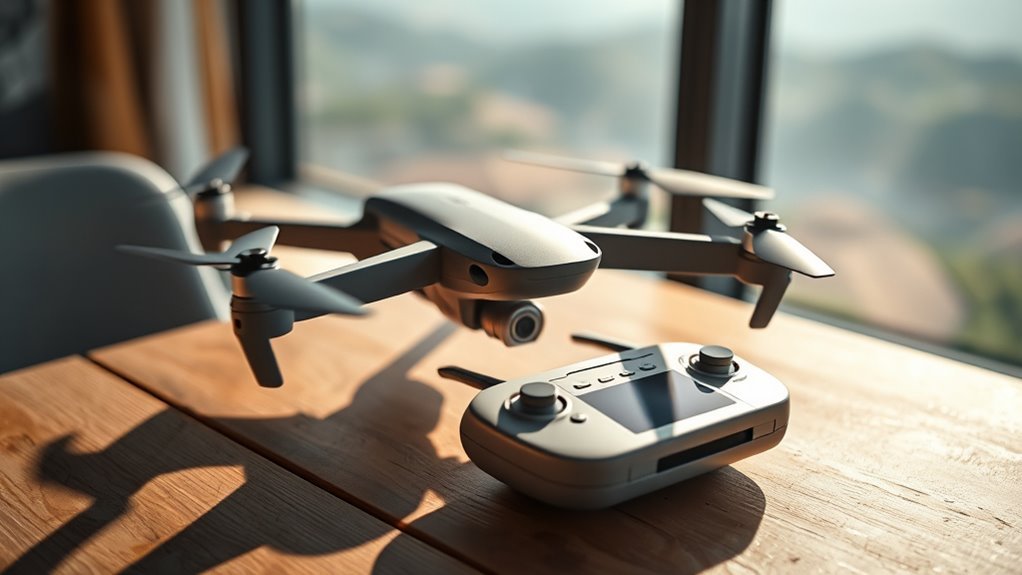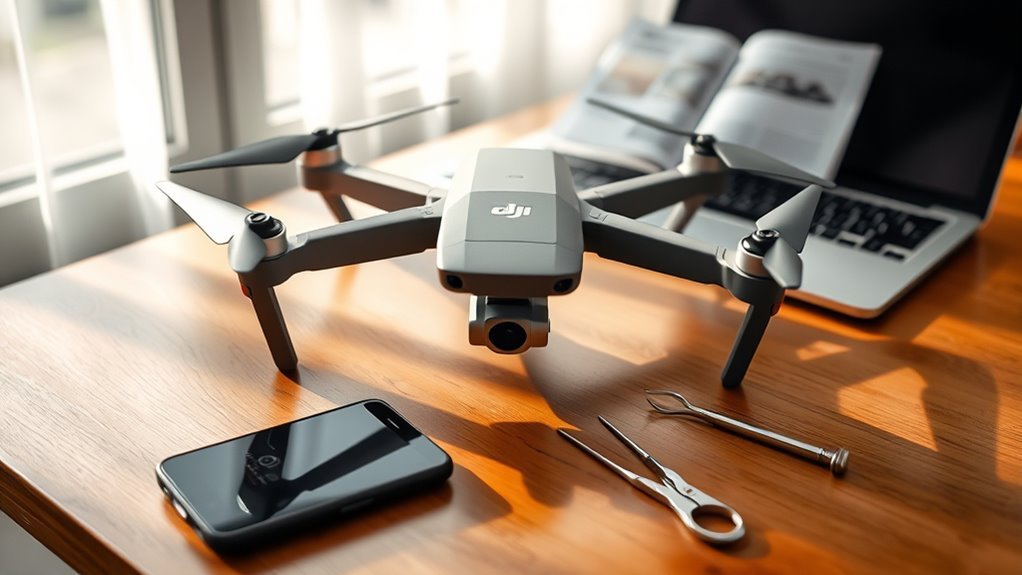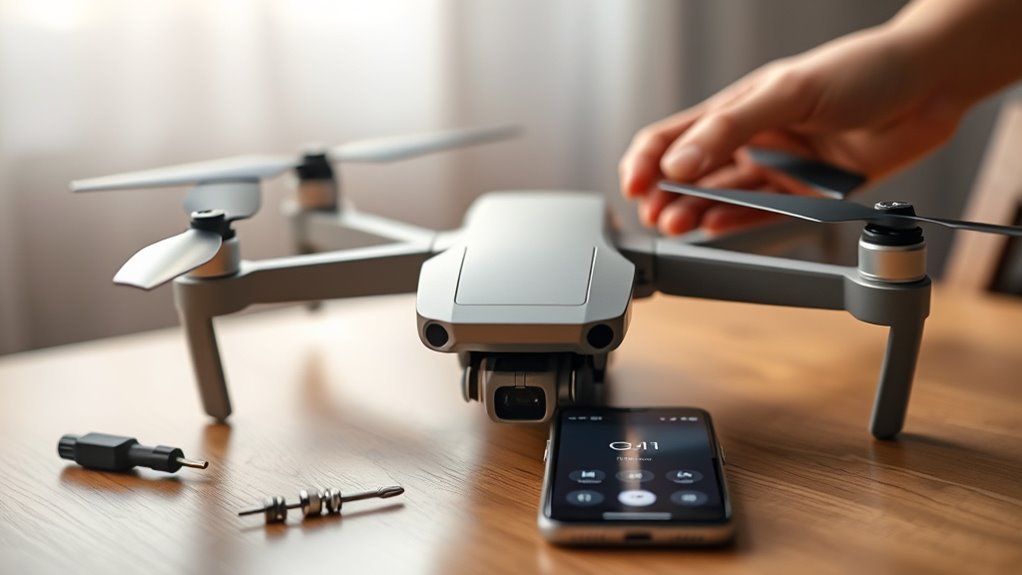To unbind your DJI drone, start by gathering essential equipment and powering on both the drone and remote controller. Access the DJI Go or Fly app to navigate to settings, then select Aircraft Management to confirm firmware compatibility. Disconnect the remote controller and verify unbinding status through the app. Finally, prepare your drone for rebinding or selling if needed. Follow these precise steps for a seamless unbinding experience, and you’ll uncover further details to streamline the process.
Gather Necessary Equipment

Before you begin the unbinding process for your DJI drone, it’s crucial to gather the necessary equipment to guarantee a smooth and efficient operation. Start by creating an equipment checklist to verify you have all essential tools at your disposal. You’ll need a compatible mobile device with the DJI app installed, a stable internet connection for updates, and the original remote controller. Additionally, have a USB cable handy for potential firmware updates. Confirm your drone’s battery is charged to avoid interruptions. Finally, consider having a safe workspace, free from distractions, to maintain focus during this technical procedure. By being well-prepared, you’re setting the foundation for a successful unbinding experience, paving the way for freedom in your drone operations.
Power On Your Drone and Remote Controller

To initiate the unbinding process, you’ll need to power on both your DJI drone and its remote controller. This step is essential for a successful drone setup and remote pairing. Make sure both devices are charged to avoid interruptions during the process.
Here’s a quick reference table to assist you:
| Device | Power Button Location | Power Indicator |
|---|---|---|
| DJI Drone | On the battery cover | LED lights on body |
| Remote Controller | On the top left side | LED lights on screen |
| Battery Level | Check via app | N/A |
| Connection Status | Stabilized lights | N/A |
Once powered on, wait for the devices to establish a connection before moving to the next steps.
Access the DJI Go or Fly App

With your drone and remote controller powered on and connected, the next step involves accessing the DJI Go or Fly app on your mobile device. This app is essential for managing your drone’s performance and settings.
Ensure your drone and remote controller are powered on, then launch the DJI Go or Fly app to manage your drone’s settings effectively.
Once you open the app, you’ll notice its user interface is designed for ease of use. Familiarizing yourself with its core app features will enhance your flying experience. Here are some key aspects to explore:
- Live Camera Feed: View real-time footage from your drone’s camera.
- Flight Data: Analyze data such as altitude, speed, and battery level.
- Settings Access: Adjust parameters for best flight performance.
Understanding these features will empower you, giving you the freedom to control your drone effectively. Additionally, the app integrates advanced flight stability features that optimize your aerial photography sessions.
Navigate to the Settings Menu
Accessing the Settings menu is crucial for modifying your drone’s operational parameters and guaranteeing ideal performance. To begin your settings navigation, launch the DJI Go or Fly App and look for the gear icon, typically located in the upper right corner of the screen. Tap it to enter the Settings menu, where you’ll find various options for menu customization tailored to your preferences. Here, you can adjust flight settings, control sensitivity, and safety features to enhance your flying experience. Familiarize yourself with the layout to guarantee quick access to critical adjustments. This step is essential for maintaining optimal control and maximizing your drone’s capabilities, allowing you the freedom to fly with confidence and precision.
Select the Aircraft Management Option
Once you’re in the Settings menu, selecting the Aircraft Management option is your next step. This section is essential for managing your drone’s functionality and guaranteeing peak performance. Here, you can handle various aspects of aircraft maintenance and prepare for any necessary software updates.
Selecting Aircraft Management in the Settings menu is crucial for optimizing your drone’s performance and maintaining its functionality.
You’ll want to focus on the following:
- Check Firmware Status: Verify your drone is running the latest firmware for peak performance.
- Manage Aircraft Profiles: Access and organize different profiles for various flying conditions.
- Review Maintenance Records: Keep track of past maintenance, guaranteeing your drone remains in top condition.
Choose the Unbind Option
To initiate the unbinding process, access your drone’s settings menu. Here, you’ll need to locate the unbind feature, which is typically straightforward to find. Once identified, confirm the unbinding process to complete the operation effectively.
Access Drone Settings Menu
Finding your way to the drone’s settings menu is essential for unbinding your DJI drone from its controller. You’ll need to utilize various access methods to navigate effectively. Here’s how to find the drone settings:
- Use the DJI Fly app: Open the app and connect to your drone.
- Check the remote controller display: Access the settings directly from the controller interface.
- Consult the user manual: Reference the manual for specific instructions related to your drone model.
Locate Unbind Feature
Identifying the unbind feature is essential for disconnecting your DJI drone from its remote controller. To locate this function, first, access the settings menu on your drone’s app interface. Look for the section that manages remote connections; it’s often labeled as “Remote Controller” or “Linking.” Within this section, you should find the unbind features prominently displayed. Select the unbind option, ensuring you follow the prompts carefully. It’s important to understand that this action will sever the link between your drone and controller, offering you the freedom to bind it to a different controller or to reset the connection for troubleshooting. This step is crucial for maintaining control over your drone’s operation and ensuring peak performance.
Confirm Unbinding Process
After selecting the unbind option in the settings menu, you’ll need to confirm the unbinding process. This step is essential to guarantee that your DJI drone disconnects from its current controller, allowing you to explore new unbinding methods freely.
Make sure to:
- Double-check that you’ve backed up any necessary flight logs or settings.
- Follow the on-screen prompts carefully to avoid any troubleshooting tips that could arise from incorrect steps.
- Verify the drone and remote are charged to prevent interruptions during the unbinding.
Once confirmed, your drone will be ready for a fresh start, empowering you to connect with a new controller or simply enjoy the newfound freedom of unalignment.
Confirm the Unbinding Process
To guarantee the unbinding process of your DJI drone has been successful, you’ll need to verify several key indicators. First, check for unbind confirmation within the app; it should explicitly indicate that the drone is no longer paired with your remote controller. Next, conduct a process validation by attempting to power on the drone without the remote. If it doesn’t respond, that’s a strong sign the unbinding was successful. Additionally, inspect the device settings to verify no previous connections remain active. Finally, consider resetting the drone’s firmware to eliminate any lingering data. By following these steps, you can confidently guarantee that your drone is free from previous bindings, empowering you to explore new horizons with complete control.
Disconnect the Remote Controller
Begin by powering off your DJI drone and remote controller to secure a safe disconnection process. This step is essential to prevent any unbinding issues during the process. Once powered down, focus on these key actions to disconnect the remote controller effectively:
- Check connections: Verify all wires and ports are free from debris or damage, as this can lead to remote controller troubleshooting.
- Use the DJI app: Open the app on your device to confirm that the remote connection is no longer active.
- Remove batteries: Safely remove the batteries from both the drone and remote controller to finalize the disconnection.
Verify the Unbinding Status
Once you’ve disconnected the remote controller, it’s essential to verify the unbinding status of your DJI drone. You’ll need to check the drone’s connection status, confirm that the remote controller is no longer synced, and assess any potential firmware compatibility issues. This step guarantees that the unbinding process was successful and that your drone is ready for any future configurations.
Check Drone Connection Status
Verifying the unbinding status of your DJI drone is essential to guarantee a successful disconnection from your remote controller. This step helps you avoid drone connectivity issues that could arise later. To check the connection status, follow these troubleshooting tips:
- Inspect the app: Open the DJI app and navigate to the settings. Look for the drone’s connection status indicator.
- Observe LED signals: Pay attention to any LED signals on your drone, which can provide real-time feedback on connectivity.
- Test remote functions: Attempt to operate the drone remotely to confirm it’s no longer responding to the controller.
These steps make certain that your drone is effectively unbound, allowing you the freedom to connect with a new controller without complications.
Confirm Remote Controller Sync
To guarantee your drone is properly unbound, confirming the sync status of your remote controller is essential. First, power on both the drone and the controller, then check for a stable connection. If your drone indicates a lack of drone connectivity, it’s a clear sign that unbinding was successful. You may need to consult the controller troubleshooting section of your manual for specific error codes or connection issues. If the controller still shows paired status, repeat the unbinding process. Remember, achieving seamless drone functionality requires meticulous attention to these details. Once confirmed, you’ll regain the freedom to connect to a different drone or simply enjoy an unencumbered flying experience.
Assess Firmware Compatibility Issues
After confirming the sync status of your remote controller, it’s important to assess any firmware compatibility issues that could affect the unbinding process. Verifying your drone and remote have matching firmware versions is essential. Conducting compatibility checks can save you time and frustration in the long run.
Here are key steps you should follow:
- Check for firmware updates: Visit the DJI website or app for the latest versions.
- Review compatibility notes: Verify both devices are on compatible firmware versions.
- Perform a test flight: This can help confirm that everything is functioning correctly before unbinding.
Prepare for Rebinding or Selling Your Drone
Before you proceed with rebinding or selling your DJI drone, it’s crucial to confirm that all personal data and settings are cleared. This process not only enhances security but also increases the drone’s value for potential buyers.
Here’s a quick checklist to guide you:
| Task | Description |
|---|---|
| Backup Data | Store flight logs and settings |
| Factory Reset | Restore to original settings |
| Prepare Paperwork | Include warranty and manuals |
| Selling Tips | Highlight unique features |
| Clean the Drone | Verify it’s in good condition |
Taking these steps guarantees a smooth changeover, whether you choose to rebond your device or sell it. You’re now ready to regain your freedom or pass it on to a new user.
Frequently Asked Questions
Can I Unbind My DJI Drone Without the Remote Controller?
You can’t typically complete the unbind process without the remote controller, but using remote alternatives like a mobile app or connecting to the drone directly might offer some potential solutions. However, results may vary.
What Happens if I Unbind My Drone Accidentally?
If you accidentally unbind your drone, it may feel like a bird lost in a storm. You’ll need remote troubleshooting to reconnect, or risk potential drone malfunction, limiting your freedom to soar the skies.
Will Unbinding Delete My Flight Logs or Settings?
Unbinding your drone doesn’t delete flight data or settings. The unbinding process only removes the connection between your device and the drone, allowing you to reconnect later without losing your previous flight logs or configurations.
Can I Rebind My Drone to a Different Remote Later?
Imagine a bird finding a new nest; you can indeed rebind your drone to a different remote later. Just guarantee compatibility, as each remote requires proper pairing for seamless flight and freedom in the skies.
How Can I Tell if My Drone Is Successfully Unbound?
To determine if your drone’s successfully unbound, check for unbinding indicators like the remote’s loss of connection or the drone’s inability to respond. If these occur, you’ve likely achieved successful unbinding.

